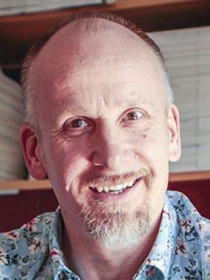
prof. dr. J.K.G. (Götz) Wietasch
Hoogleraar Anesthesiologie, Innovatie in de opleiding

E-mail:
j.k.g.wietasch umcg.nl
Vakgebied
Expertise
Full professor of Anesthesiology, Research Chair in Innovation in Postgraduate Medical Education, Leading Academic Teacher and Academic Program Director.
Research line: The primary aim of my research line is to develop knowledge that contributes to the advancement of health professions education, personal development, and clinical practice within the realm of Postgraduate Medical Education (PGME).
Research focus: The research line Innovation in Postgraduate Medical Education focuses on generating knowledge that advances health professions education, personal development, and clinical practice within Postgraduate Medical Education (PGME). It is embedded within the Lifelong Learning, Education and Assessment Research Network (LEARN) and is closely aligned with the broader research focus on the vitality and sustainable employability of (future) health professionals in a diverse society.
This research line is dedicated to fostering innovation in PGME by producing evidence-based insights that empower both educators and learners. Our work is grounded in the belief that professional development begins with the transition of passion and talent. This process is driven by curiosity, supported by autonomy, and designed to enhance creativity and well-being—ultimately leading to resilience and compassion (Wietasch 2018).
Key themes within this research include the exploration of transitions and social capital, aimed at strengthening talent development, passion, and organizational socialization (Galema 2022, 2024, 2025). These areas support the creation of sustainable and supportive learning environments. Additionally, we investigate educational renewal through methods such as e-learning, peer-assisted learning, and interprofessional education, thereby advancing both pedagogy and learner engagement (Quasinowski 2023, Sommer 2024, Ebeling 2024).
We also prioritize the management of stress, promotion of well-being, and development of resilience among healthcare professionals—elements that are vital to both individual growth and systemic sustainability (Reijmerink 2023, 2025, Boskma 2024).
Our research focuses on three core areas:
1. Transitions and Social Capital – Understanding how these mechanisms nurture passion and talent within PGME.
2. Curiosity and Well-being – Advancing educational approaches that stimulate curiosity while exploring strategies for stress management and creativity enhancement.
3. Resilience and Speaking Up – Fostering resilience and promoting a culture of open communication, essential for a healthy and sustainable learning environment in medical education.
Teaching focus: Coaching and training of residents, personal development, wellbeing and sustainable employment, qualitative and quantitative research methods, cardiovascular physiology, hemodynamic monitoring, anesthesia in metabolic and.
Educational Leadership focus: Professional development, program accreditation, curriculum development, leadership development.
Clinical focus: Anesthesia in patients with (neuro)endocrine disorders, liver disease, for neurosurgery, and advanced hemodynamic monitoring.
Research line: The primary aim of my research line is to develop knowledge that contributes to the advancement of health professions education, personal development, and clinical practice within the realm of Postgraduate Medical Education (PGME).
Research focus: The research line Innovation in Postgraduate Medical Education focuses on generating knowledge that advances health professions education, personal development, and clinical practice within Postgraduate Medical Education (PGME). It is embedded within the Lifelong Learning, Education and Assessment Research Network (LEARN) and is closely aligned with the broader research focus on the vitality and sustainable employability of (future) health professionals in a diverse society.
This research line is dedicated to fostering innovation in PGME by producing evidence-based insights that empower both educators and learners. Our work is grounded in the belief that professional development begins with the transition of passion and talent. This process is driven by curiosity, supported by autonomy, and designed to enhance creativity and well-being—ultimately leading to resilience and compassion (Wietasch 2018).
Key themes within this research include the exploration of transitions and social capital, aimed at strengthening talent development, passion, and organizational socialization (Galema 2022, 2024, 2025). These areas support the creation of sustainable and supportive learning environments. Additionally, we investigate educational renewal through methods such as e-learning, peer-assisted learning, and interprofessional education, thereby advancing both pedagogy and learner engagement (Quasinowski 2023, Sommer 2024, Ebeling 2024).
We also prioritize the management of stress, promotion of well-being, and development of resilience among healthcare professionals—elements that are vital to both individual growth and systemic sustainability (Reijmerink 2023, 2025, Boskma 2024).
Our research focuses on three core areas:
1. Transitions and Social Capital – Understanding how these mechanisms nurture passion and talent within PGME.
2. Curiosity and Well-being – Advancing educational approaches that stimulate curiosity while exploring strategies for stress management and creativity enhancement.
3. Resilience and Speaking Up – Fostering resilience and promoting a culture of open communication, essential for a healthy and sustainable learning environment in medical education.
Teaching focus: Coaching and training of residents, personal development, wellbeing and sustainable employment, qualitative and quantitative research methods, cardiovascular physiology, hemodynamic monitoring, anesthesia in metabolic and.
Educational Leadership focus: Professional development, program accreditation, curriculum development, leadership development.
Clinical focus: Anesthesia in patients with (neuro)endocrine disorders, liver disease, for neurosurgery, and advanced hemodynamic monitoring.
Overige functies
- Chair of the stering commitee on regional residency education, North- and East-Netherland
- Chair of the curriculum advisory board PA Master at Hanze University of Applied Science Groningen
- Auditor and Expert at College of Healthcare Education Programmes (CZO)
- Auditor Institutional Certification and Evaluation , Registration Committee for Medical Specialists (RGS)
Laatst gewijzigd:22 januari 2026 18:41
